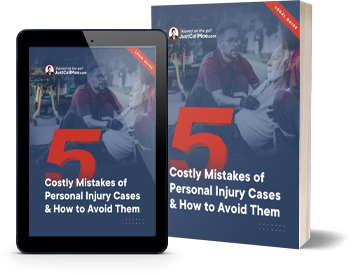Camp Lejeune Toxic Water Victims
For decades, the brave men and women stationed at Camp Lejeune were unknowingly exposed to toxic water, leading to a range of serious health conditions. If you or a loved one were stationed at Camp Lejeune and have since developed health issues, you may be eligible for compensation. Our dedicated team of legal experts is here to guide you through the process of filing a Camp Lejeune lawsuit.
Our dedicated team of experienced attorneys focus on Camp Lejeune cases and provide personalized and compassionate legal representation to victims and their families. We understand the unique challenges faced by those affected by the contaminated water at Camp Lejeune and are committed to fighting for their rights. With our in-depth knowledge, extensive resources, and unwavering dedication, we strive to maximize compensation and deliver justice to those impacted by this environmental disaster.
Who is Eligible for a Camp Lejeune Lawsuit?
Eligibility for a Camp Lejeune lawsuit extends to veterans, military personnel, and their family members who were stationed at the base between August 1953 and December 1987. If you were exposed to the toxic water for at least 30 days during this period and have since developed certain health conditions, you may be eligible for compensation.
The list of qualifying health conditions includes, but is not limited to:
Parkinson’s Disease: A neurodegenerative disorder that affects movement control, causing symptoms such as tremors, stiffness, and balance problems.
Lung Cancer: A type of cancer that begins in the lungs. It’s typically caused by smoking, but exposure to certain toxic substances can also increase the risk.
Kidney Cancer: A type of cancer that begins in the kidneys. Certain substances, including some of those found in the contaminated water at Camp Lejeune, can increase the risk of kidney cancer.
Non-Hodgkin’s Lymphoma: A cancer that originates in the lymphatic system, the body’s disease-fighting network. Exposure to certain chemicals can increase the risk of developing this type of cancer.
Leukemia: A type of cancer that affects the body’s blood-forming tissues, including the bone marrow and the lymphatic system. Certain chemicals can increase the risk of leukemia.
Liver Cancer: A type of cancer that begins in the cells of the liver. Exposure to certain toxic substances can increase the risk of liver cancer.
Bladder Cancer: A type of cancer that begins in the bladder. Certain chemicals can increase the risk of bladder cancer.
Multiple Myeloma: A cancer that forms in a type of white blood cell called a plasma cell. Certain chemicals can increase the risk of multiple myeloma.
Adult Leukemia: A type of cancer that starts in the blood-forming cells of the bone marrow. Exposure to certain chemicals can increase the risk of adult leukemia.
Aplastic Anemia and Other Myelodysplastic Syndromes: Conditions that occur when the bone marrow stops making enough healthy blood cells. Certain chemicals can increase the risk of these conditions.
If you or a loved one were stationed at Camp Lejeune during the specified period and have since developed one of these health conditions, you may be eligible to file a lawsuit for compensation. It’s recommended to consult with a legal professional to understand your rights and the process involved.
Camp Lejeune Wrongful Death Lawsuits
If a loved one has died due to the water contamination at Camp Lejeune, you may be eligible to bring a wrongful death lawsuit. The Camp Lejeune Justice Act, which is part of the larger Honoring Our Pact Act (PACT Act), now allows surviving family members of victims to bring wrongful death lawsuits against the federal government. This law applies even if the victim of the Camp Lejeune water contamination died decades ago.
To bring a successful wrongful death claim, family members will need to prove that the decedent lived or worked at Camp Lejeune during the contamination period and that they died prematurely from a health condition associated with the water contamination. The health conditions linked to the contaminated water at Camp Lejeune include kidney cancer, bladder cancer, prostate cancer, breast cancer, leukemia, Parkinson’s disease, and birth defects.
The compensation for successful wrongful death lawsuits can be substantial, potentially ranging from $250,000 to $1,000,000. The exact amount will depend on various factors, including the specifics of the case and the damages suffered by the family.
Infant Deaths at Camp Lejeune
Hundreds of infants died at Camp Lejeune due to the water contamination. “Baby Heaven” is a term used to refer to a section of a cemetery near Camp Lejeune, North Carolina, where hundreds of infants were buried between 1953 and 1987. This was the same period during which people living or working at Camp Lejeune were potentially exposed to water containing toxins. The toxins included trichloroethylene, benzene, and perchloroethylene, and the concentration of the water was between 240-3400 times higher than the level allowed by safety standards at the time.
The high number of infant deaths during this period, and the subsequent naming of the cemetery section as “Baby Heaven,” has led many to believe that these deaths were linked to the water contamination at the base. Decades later, scientists linked possible exposure to toxic water to diseases such as kidney cancer, leukemia, and liver cancer.
Many families who lost children during this time have come forward to share their stories and seek justice for their loved ones. If you of a loved one had a child die at Camp Lejeune, you may be eligible for compensation and should contact a lawyer immediately to see if you qualify to file a Camp Lejeune lawsuit.
How Long Do I Have To File a Claim?
The statute of limitations for filing a Camp Lejeune lawsuit is generally two years from the date the Camp Lejeune Justice Act of 2022 was passed. The Act also states that if your original claim for compensation was denied, you have 180 days from the Act’s passing to take legal action. President Biden signed the Camp Lejeune Justice Act of 2022 into law on August 10, 2022. This means the Act gives people until August 10, 2024, to demand damages if their illness is linked to Camp Lejeune’s water. Failure to file your case before the deadline expires may disqualify you from eligibility for compensation under the Camp Lejeune Justice Act of 2022.
To be eligible to file for damages, you must have lived or worked at Camp Lejeune for a minimum of 30 days between 1953 and 1987. That includes both active-duty Marines, non-military support staff, and their families. You must also be able to provide specific documentation (e.g., service records, employment records) that verify your time at the base during the period when the water was contaminated. You will also need to show medical records diagnosing you with a condition related to the contaminated water supply.
How We Can Help You with Your Camp Lejeune Lawsuit
Our team of legal experts is committed to helping Camp Lejeune victims receive the compensation they deserve. We provide comprehensive legal services, including:
Case Evaluation: We offer free case evaluations to determine your eligibility for a Camp Lejeune lawsuit.
Legal Representation: Our experienced attorneys will represent you in your lawsuit, ensuring your case is presented effectively.
Settlement Negotiation: We will negotiate on your behalf to secure the best possible settlement for your claim.
Why Choose Us for Your Camp Lejeune Lawsuit?
Expertise: Our team has extensive experience in handling Camp Lejeune lawsuits, ensuring you receive the best possible legal representation.
Commitment: We are committed to helping our clients receive the compensation they deserve. We work on a contingency basis, meaning you pay nothing unless we win your case.
Local Presence: We are a local law firm with a deep understanding of North Carolina law and the specific challenges faced by Camp Lejeune victims.
What are the Camp Lejeune Lawsuits About?
Camp Lejeune is a United States Marine Corps base located in Jacksonville, North Carolina. It is the largest Marine Corps base on the East Coast of the U.S. and has been operational since 1941.
The lawsuits related to Camp Lejeune are primarily about water contamination that occurred at the base. Between the 1950s and 1980s, people living or working at the base were exposed to contaminated drinking water. The water was polluted with harmful chemicals at concentrations up to 240 to 3,400 times levels permitted by safety standards. The primary chemicals involved were volatile organic compounds, including trichloroethylene (TCE), a metal degreaser, and perchloroethylene (PCE), a dry-cleaning agent, as well as benzene and vinyl chloride.
Many people who lived or worked at Camp Lejeune during this time have developed health problems, including various types of cancer, Parkinson’s disease, and other conditions. The lawsuits allege that the U.S. government, which oversees the Marine Corps, was negligent in its handling of the situation. The plaintiffs in these lawsuits are seeking compensation for medical expenses, pain and suffering, and other damages.
In 2012, the U.S. government passed the Honoring America’s Veterans and Caring for Camp Lejeune Families Act, which provides medical care for former residents suffering from certain diseases believed to be related to the contamination. However, many victims and their families have also sought additional compensation through the courts.
As of 2023, the lawsuits are ongoing, with thousands of claims filed and more expected. The U.S. Department of Justice has been urging for an expedited process due to the sheer volume of lawsuits.
Honoring America’s Veterans and Caring for Camp Lejeune Families Act of 2012
The law that was passed to aid victims of the Camp Lejeune water contamination is the “Honoring America’s Veterans and Caring for Camp Lejeune Families Act of 2012,” also known as the Janey Ensminger Act. This law was named after Janey Ensminger, the daughter of a Marine who died from leukemia at age 9, a condition believed to be linked to the water contamination at Camp Lejeune.
The law provides medical care to veterans and their family members who have specific diseases and conditions associated with exposure to contaminated water at Camp Lejeune. The Department of Veterans Affairs (VA) provides this care.
The law covers 15 health conditions, including several types of cancer (like kidney, liver, lung, and breast cancer), leukemia, non-Hodgkin’s lymphoma, Parkinson’s disease, and others.
To be eligible for this healthcare coverage, veterans or family members must have lived or worked at Camp Lejeune for at least 30 cumulative days between August 1, 1953, and December 31, 1987.
It’s important to note that while this law provides for medical care, it does not provide disability compensation. That is, it does not provide monthly payments like those given to veterans who have health problems directly connected to their military service. However, in 2017, the VA established a rule that allows veterans who were stationed at Camp Lejeune and have been diagnosed with one of eight conditions to file for disability compensation.
The eight conditions recognized for disability compensation are adult leukemia, aplastic anemia, bladder cancer, kidney cancer, liver cancer, multiple myeloma, non-Hodgkin’s lymphoma, and Parkinson’s disease.
To access the benefits provided by the Janey Ensminger Act or to file for disability compensation, eligible individuals need to apply through the Department of Veterans Affairs.
Latest Camp Lejeune Lawsuit News
Claim Count: As of July 5, 2023, the claim count has risen to over 70,000 administrative claims. The most common health conditions associated with these claims include Parkinson’s Disease, Lung Cancer, Kidney Cancer, Non-Hodgkin’s Lymphoma, Bladder Cancer, Leukemia, Prostate Cancer, Liver Cancer, Breast Cancer, and Hepatic Steatosis, among others.
Government Defenses: On June 27, 2023, U.S. District Judge Terrence W. Boyle ruled that the federal government could maintain its affirmative defenses against allegations that water contamination at the Camp Lejeune Marine base led to people being poisoned.
DOJ Pushes for Expedited Process: The U.S. Department of Justice has urged federal judges managing the water contamination litigation at Marine Corps Base Camp Lejeune to expedite their case management strategy. The need for swift action stems from the sheer volume of lawsuits arising from the contaminated drinking water at the North Carolina base.
Navy Blames Budget and Staffing Limitations for Slow Response: The Navy claims it is facing financial and staffing limitations in reviewing compensation claims from veterans affected by toxic water at Camp Lejeune. Navy attorney Jennifer Tennile Karnes acknowledged this in an email to Camp Lejeune lawyers, mentioning that the tort claims unit is working extensive overtime to process claims and aims to increase staff by the end of summer.
Pressure for Camp Lejeune Settlement Mounts: A bipartisan coalition of lawmakers is increasing pressure on the Navy for failing to resolve cases of toxic water poisoning at the Camp Lejeune Marine Base, nine months after President Biden signed a bill to establish a process for addressing veterans’ health claims.
Please note that the situation is evolving, and it’s recommended to stay updated with the latest news for the most accurate information. We provide regular updates on the latest news and developments in Camp Lejeune lawsuits. Stay informed about the progress of your case and the latest legal trends by visiting our blog.
If you or a loved one were affected by the toxic water at Camp Lejeune, contact us today for a free consultation. Let JustCallMoe help you get the compensation you deserve!
Frequently Asked Questions About Camp Lejeune Cases
What is the Camp Lejeune water contamination issue?
Between the 1950s and 1980s, people living or working at the U.S. Marine Corps Base Camp Lejeune, North Carolina, were potentially exposed to drinking water contaminated with industrial solvents, benzene, and other chemicals. This exposure may lead to adverse health conditions.
Who is eligible to file a Camp Lejeune lawsuit?
Veterans, military personnel, and their family members who lived at Camp Lejeune for at least 30 days between August 1953 and December 1987 and have since developed certain diseases may be eligible for compensation.
What health conditions are associated with the Camp Lejeune water contamination?
Several health conditions have been associated with the water contamination, including kidney cancer, liver cancer, non-Hodgkin’s lymphoma, leukemia, Parkinson’s disease, and others.
How can I file a Camp Lejeune lawsuit?
It’s recommended to consult with a lawyer experienced in Camp Lejeune cases. They can guide you through the process, which includes gathering evidence, filing the lawsuit, and representing you in court or settlement negotiations.
What kind of compensation can I expect from a Camp Lejeune lawsuit?
The amount of compensation can vary greatly depending on the specifics of your case, including the severity of your illness, the impact on your quality of life, and other factors. It’s best to discuss this with your lawyer.
What is the cost of filing a Camp Lejeune lawsuit?
We handle Camp Lejeune cases on a contingency fee basis, meaning you pay nothing unless you win your case. The lawyer’s fee is then a percentage of the settlement or award.
Florida Auto Accident Lawyer
You Don't Pay, Unless We Win.

When you've been injured in an accident, you're likely dealing with much more than just your injuries and property damage. Dealing with your insurance claim can be an added stressor that you shouldn't have to worry about. When you call us, we'll take the burden of dealing with the insurance companies off your shoulders. We'll deal with the insurance company, so you can focus on getting better.
About Us Play Video
 (866) 225-5663
(866) 225-5663

 100% Secure and Confidential
100% Secure and Confidential


